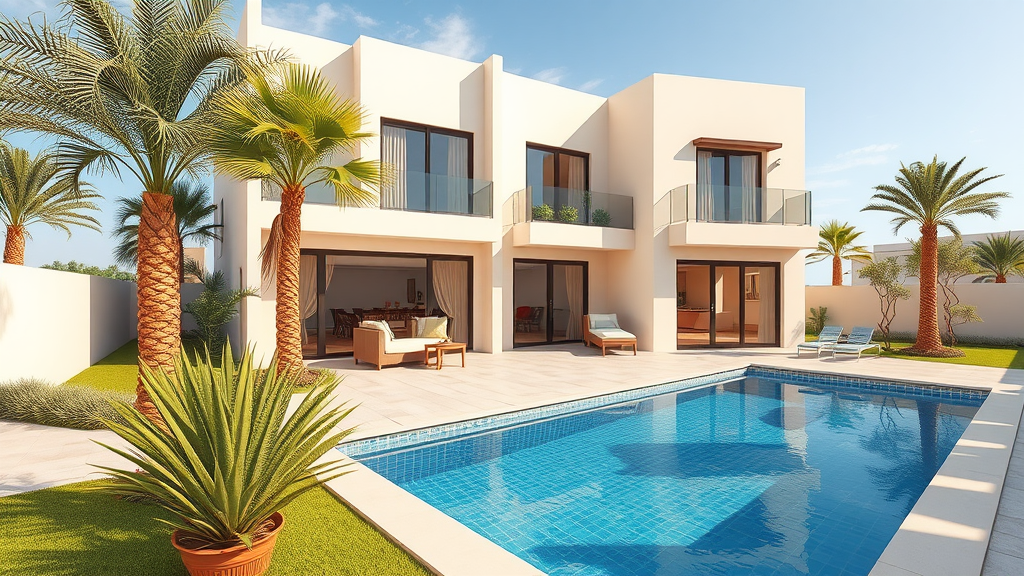Key legal considerations for expats purchasing waterfront villas in al safwa
Purchasing a waterfront villa in Al Safwa is an attractive option for many expatriates, offering stunning views and a vibrant lifestyle. However, navigating the legal landscape can be daunting. To ensure a smooth transaction and protect your interests, it’s crucial to understand key legal considerations.
Firstly, familiarize yourself with property ownership laws in the region. In Al Safwa, expatriates are often allowed to buy real estate, but there may be restrictions regarding freehold ownership. It’s essential to confirm the official regulations with local authorities or consult with a legal expert specializing in real estate.
Another vital consideration is understanding the property title. Ensure that the villa you’re considering has a clear title. A title search can reveal any potential liens or encumbrances on the property. This step will help you avoid unexpected legal complications after purchase.
Moreover, it’s advisable to hire a qualified real estate attorney. An experienced lawyer can provide invaluable guidance throughout the purchasing process. They can assist you in reviewing contracts, ensuring compliance with local laws, and negotiating terms. Investing in legal counsel might seem like an additional cost, but it can save you money and stress in the long run.
When it comes to the purchasing process, a crucial legal document is the sales agreement. This contract outlines the terms and obligations of both parties. Ensure that all details regarding the property, price, and payment plans are clearly stated. Paying attention to these details can prevent disputes later on.
Another factor to consider is the fees associated with property purchase. Typically, buyers may face various costs including:
- Real estate agent fees
- Notary and registration fees
- Stamp duties
- Property tax obligations
Understanding and budgeting for these expenses can avoid financial surprises.
Additionally, review the regulations surrounding property maintenance and development in Al Safwa. Some communities have strict guidelines regarding renovations or landscaping. Knowing these rules beforehand will help you maintain compliance and avoid fines.
Expatriates should also be aware of any zoning regulations that could impact their ownership. Confirm whether the area is designated for residential use and if any future developments may affect your property’s value or enjoyment. Zoning laws can change, so it’s wise to conduct thorough research.
If you’re looking to rent out your waterfront villa, familiarize yourself with the local rental laws. These laws dictate tenant rights, rental contracts, and landlord responsibilities. Ensure you comply with all regulations to avoid potential legal issues in the future.
Tax implications are another critical legal factor to consider. Expatriates may be subject to different tax responsibilities than locals. Research the tax laws relevant to foreign property ownership and seek advice from a financial advisor or tax professional. Understanding your tax obligations can prevent surprises come tax season.
In the event of a dispute, it’s important to know the local methods of resolving conflicts. Explore options such as mediation or arbitration, which can provide a more efficient and less costly resolution than a lengthy court battle. Having a plan in place for dispute resolution ensures you’re prepared for any challenges that may arise.
Your financial security is also something to consider carefully. Verify the credibility and financial standing of any developers or builders involved in your transaction. This step will protect your investments and provide peace of mind when purchasing your dream home.
Emphasize the importance of understanding your rights as a property owner. Familiarize yourself with local homeowner associations or community regulations that may apply. Being well-informed about your rights and obligations can smooth out potential issues and enhance your living experience.
Purchasing a waterfront villa in Al Safwa can be a rewarding venture for expatriates. By considering these key legal aspects and consulting with professionals, you can navigate the complexities of real estate transactions confidently and securely. Your dream villa is within reach, and with the right knowledge and support, you can make the process seamless.
Navigating property ownership laws in the uae for foreign buyers
Purchasing property in the United Arab Emirates (UAE) can be an exciting venture for foreign buyers. However, understanding property ownership laws is crucial to ensure a smooth experience. The UAE has made significant strides in attracting foreign investment, particularly in real estate, and knowing the rules can help you avoid potential pitfalls.
The UAE allows foreigners to own property in designated areas known as freehold areas. There are several key areas where foreign property ownership is permitted, including Dubai, Abu Dhabi, and areas on various emirate shores. Within these freehold zones, you can purchase residential properties, such as villas and apartments, or even commercial properties.
Types of property ownership
Foreign buyers can engage in two main types of property ownership:
- Freehold Ownership: This allows the buyer to own the property and the land it is built on indefinitely. This type of property comes with full rights to lease, rent, or sell the property.
- Leasehold Ownership: In this agreement, you own the property for a specified period—typically up to 99 years—while the land remains under the ownership of the landowner. At the end of the lease term, the ownership reverts to the landowner.
Legal framework for foreign buyers
The legalities surrounding property ownership in the UAE can be complex. It’s essential to familiarize yourself with the following aspects:
- Property Registration: Once a purchase is made, it must be registered with the relevant land department. The registration process can take time, and you will need to provide essential documents, such as your ID, a sales and purchase agreement, and proof of payment.
- Due Diligence: Before buying, conduct thorough research on the property and developer. Investigate the developer’s credibility, review their history of completing projects, and ensure the property is not encumbered with debts or disputes.
- Service Charges: Owning property comes with ongoing costs, including maintenance fees, community service charges, and utility bills. Be sure to account for these when budgeting for your new home.
Financing your purchase
Foreign buyers can apply for mortgages in the UAE, though the terms may vary. Here are critical points to consider:
- Mortgage Terms: Banks may offer varying loan durations, typically ranging from 15 to 25 years. Most banks require a down payment of 20-30% of the property value for expats.
- Documentation: Prepare the necessary documentation, which usually includes proof of income, credit history, and identification. It’s wise to consult with financial institutions to understand eligibility requirements.
Tax implications
One of the attractive features of investing in property in the UAE is the absence of property taxes. However, understanding the following points is essential:
- Property Transfer Fees: When purchasing a property, expect to pay a transfer fee to the local authorities, usually between 2 and 4% of the sales price.
- Rental Income Tax: If you plan to rent out your property, be mindful that rental income is taxable in some jurisdictions, although the UAE generally offers favorable conditions for property investors.
Legal assistance
Working with a legal expert who specializes in UAE real estate is advisable. Legal professionals can help clarify laws and navigate the paperwork involved in purchasing property. They play a vital role in ensuring all contracts are in order, and the transaction complies with local regulations.
In addition to ensuring compliance, having local legal assistance can greatly enhance your understanding of your rights and obligations as a property owner. They can help you avoid common mistakes that could lead to financial loss or legal issues down the line.
Ultimately, purchasing property in the UAE can be a rewarding experience, provided you are well-informed about the laws and processes involved. By doing thorough research, enlisting professional help, and understanding your rights, you can confidently navigate the property ownership landscape as a foreign buyer.
Purchasing a waterfront villa in Al Safwa can be an exciting venture for expats, offering breathtaking views and a unique lifestyle. However, it’s important to approach this investment with a clear understanding of the legal landscape surrounding property ownership in the UAE. By keeping key legal considerations in mind, such as property rights and ownership regulations for foreign buyers, you can navigate the complexities of the UAE real estate market more effectively.
Understanding the legal framework governing property ownership in the UAE is crucial for making informed decisions. Expats must familiarize themselves with the specific laws applicable to foreign buyers, including restrictions and requirements that may vary by emirate. Knowing your rights and obligations ensures that your investment is secure and compliant with local regulations.
Additionally, seeking legal advice can prove invaluable. Consulting with a real estate lawyer who specializes in UAE property law will help you avoid potential pitfalls. They can assist you in investigating property titles, reviewing contracts, and ensuring all transactions comply with local regulations. This proactive approach not only protects your investment but also provides peace of mind as you settle into your new home.
Engaging with experienced local real estate professionals can further ease the process, offering insights into market trends and helping you find the right property that meets your needs. By doing your due diligence and understanding the legal aspects involved, you’re not just purchasing a villa; you’re securing a dream lifestyle in one of the most stunning waterfront areas of the UAE. Start your journey well-informed to truly make the most of your new adventure in Al Safwa.
22% cheaper – 1 bedroom apartments with gardens in Al Ahyaa Hurghada under 50k — sea view properties for dutch retirees
19% off – 3 bedroom apartments for sale in long beach resort Hurghada under 150k — beachfront properties for norwegian golfers












